The Box Ticker
Tales from behind the boxes I tick on 'Equal Opportunity' forms.
Wednesday 11 September 2013
An Adventure in Arse Avoidance
Friday 6 September 2013
An Adventure in Fence Theft
Monday 24 June 2013
An Adventure in Implied Buts
"You're not fat... you're beautiful"
How many times have you heard that? It may seem like a compliment. Telling somebody they are beautiful - that's a good thing, right? And telling somebody they are fat - that's an insult. The problem here is with the implied 'but'.

"You're not fat - but beautiful."
The 'but' implies that fat and beautiful are mutually exclusive. Some people are fat, and telling them that they aren't achieves nothing. All a statement such as this does is reinforce the belief that fat is a Bad Thing, and that beautiful a Good Thing.
But what if somebody ISN'T beautiful?
"You're not ugly... you're awesome!"
We aren't easily fooled. There is a set standard of beauty to which we compare ourselves and others. If we don't match up, we know. And what's more, cosmetics companies know, and they profit from our insecurities and desperate need to get closer to this image of perfection.
How much money would a campaign like this make?

The message is clear. You can't be ugly and awesome. And if being fat means you can't be beautiful, then you can't be fat and awesome either. We have to be surrounded by the message that everybody is beautiful, and by extension not fat, because otherwise we can't believe that we, ourselves, might be awesome.
Frequently people are told that looks don't matter if one possesses an 'inner beauty' which 'shines through'. I find this equally problematic. I don't want any part of me to be measured by how 'beautiful' it is. Why should my personality be judged by an aesthetic quality?
When I was receiving inpatient treatment for anorexia, a lot of time was dedicated to reassuring patients that they were smaller than they perceived themselves to be.
"You aren't fat".
Of course this is often necessary, especially in early stages of recovery. Even as I write this, I admit that I am guilty of asking for reassurance that I am not fat. Forgive me, reader, for this hypocrisy. I'm working on it.
Treating disturbed body image by pretending that the Feared Thing won't happen, when it might, doesn't work. It is more sensible to teach people that the Feared Thing isn't all that scary. Let me demonstrate.
It's the difference between this:

And this:

Or, alternatively this:

And this:

It's the difference between telling somebody that that they aren't getting fatter, (which, when you are putting on weight as part of treatment, is a misnomer), and telling somebody that there is no shame in being fat anyway. There is no such thing as a fat person or a skinny person. There are just people, with different, fluctuating bodies. Body shaming has no place in treating eating disorders.
What we need to hear, what everybody needs to hear more of, is this.
"You can be fat AND beautiful. You can be a great person and NOT beautiful. You can be fat and living a healthy lifestyle. You can be fat, not beautiful, not healthy and STILL BE a great person. There is no correlation between a person's size and a person's entitlement to a good life on this planet."
We need to stop conflating meanings. More to the point, we need to stop making unsubstantiated connections between separate personal attributes.
Let's stop trying to convince everybody that they are beautiful, that they aren't fat, and instead try to convince them that it doesn't matter.
Not yours... mine,
BT
Sunday 16 June 2013
An Adventure in Normality
I often wonder how strangers view me. I imagine it's something like this.
Okay, so the hair colour is wishful thinking. Additionally, in my own mind I look far more awkward and far less desirable, but I'm trying to shelve the Beaver of Half-Truths for now.
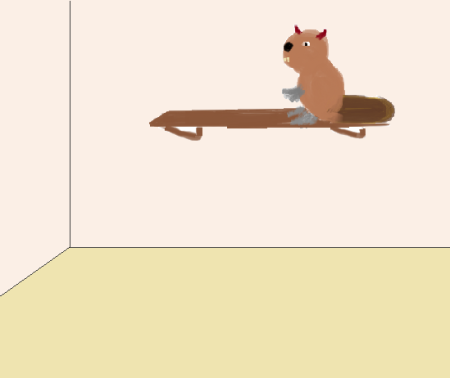
I try not to give too much thought to how strangers view me. On the other hand, acquaintances, friends and people who have the ability to make an impact on my life are much more important.
I love people. I'm recovering from social anxiety disorder, and actually being able to socialise is a recently discovered joy. I cannot describe how freeing it feels to have an open conversation with somebody, despite how difficult I still find it.
Presenting myself to other people, however, does not come without its perils.
I sometimes wonder how acquaintances view me. I imagine it's something like this.
Developing a closer relationship with a person involves filling in a lot of those gaps. It may seem like I tend to focus conversation on the distinguishing parts of my life, but if I don't explain the context of my words and actions then I risk being misunderstood. I risk being perceived as lazy, rude and a liar.
We all make assumptions. It is easiest to assess a social situation (and, from an evolutionary perspective, to judge if people are dangerous), if you have a 'standard' model with which to compare others. The issue is that if I asked most people, out of context, to imagine the standard model of a human being - it would probably look a lot like this.
I don't know about you, but that doesn't describe me. If people try to gage my personality by matching me up to those traits, then I come off pretty badly. More pressingly, I come off as incredibly boring.
Imagine we live in a world were everybody owns a unicorn; it's your mode of transport, it's your main source of support and you're its companion. At the age of 5, as oft happens, your unicorn turns into a dragon. I'm sure this is a scenario we can all relate to.
People generally don't have a problem with dragons. They're a bit afraid of them, because they are so used to unicorns and have heard that dragons can be unpredictable, but social acceptance is on the up. There are also laws in place to make sure that dragon owners aren't discriminated against.
Still, you feel lonely, and as if your identity as a dragon owner is invisible and invalid. You are made to feel like The Other; as though you are not only a deviation, but a deviant.
You are alienated from peers.
You are alienated from learning.

You are alienated from the media.

You are alienated from popular opinion.
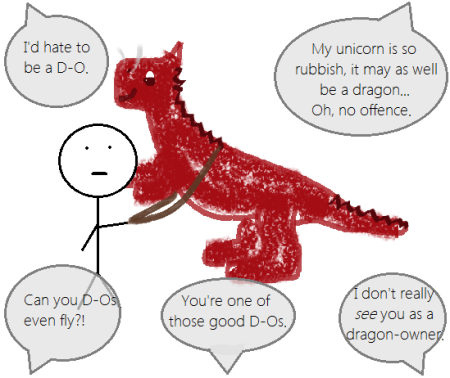
This is why we need women's and black history months - because white men are disproportionately visible throughout taught history. This is why we need LGBTQ pride events - because straight people have never been told they should feel ashamed of being straight. This is why we need 'reasonable adjustments' for disabled people - because the able bodied live in a world that was built with them in mind.
It's not the fault of the D-Os that all the parking spaces are for unicorns. It is not unreasonable to request that parking spaces cater for all mythological creatures.
Speaking as somebody who has grown up with white privilege, I used to think that the best way to tackle racism was to be 'colour blind'. I would go to great lengths to describe the physical appearance of a person without mentioning skin colour, and would try to view all people through my own lens. After all, I am human, my experiences are human experiences, therefore other people must be coming from the same human point, right?
I now realise that by doing this was white washing all the experiences of black people. I was assuming that my lens - my white lens - was the neutral human one.

By not viewing black people as black people, I was, by default, trying to view them as white.
Black is not a dirty word. Likewise, disabled is not a dirty word, neither is gay, or fat or skinny or female or trans or any other adjectives humans apply to themselves. They are merely descriptors, providing a explanatory short-cut for how we relate to the world. Of course it would be nice to think that, one day, we will no longer need to label ourselves. Until then, it's important to show the world that these varied identities exist - and that they are no less valid. Let's celebrate our different normalities rather than celebrating conformity to this idea of a 'standard' model!
Occasionally wonder how my friends see me. I hope it's something like this.
I am all of these things and more. I won't dilute my experiences. To let others assume that I am anything different - to transmogrify myself so that I can be understood next to the 'standard' model - is to do me a disservice. I am not putting a horn on my dragon and banning it from breathing fire. This is my normality. What's yours?
Yours uniquely (just like everybody else),
BT
Friday 3 May 2013
An Adventure in Polygon Discrimination
I am a big fan of intersectionality.
If that doesn't mean anything to you, then don't worry - it didn't to me until quite recently. 'Intersectionality' is feminist jargon for 'all of us - all groups of society - we ALL need to work together to achieve equality'. As somebody who identifies as female, as queer, as crippled and mental, as well as being white, cisgendered and middle class it should be obvious why this simple, (yet oft misinterpreted) idea is so important to me. Here is an excellent drawing by http://miriamdobson.wordpress.com to aid explanation.
I love analogies, and I love drawings, so I thought I'd take the polygon metaphor from Miriam's blog and develop it to explain another part of feminism, which I initially struggled to grasp - privilege.
You are probably familiar with the basic definition of the word 'privilege'.
A special right, advantage, or immunity granted or available only to one person or group of people.
In feminism, it is used extensively to refer to members of oppressed and liberated social groups. This doesn't just mean wealthy as opposed to poor, but also male as opposed to female, white as opposed to black, and countless others. As explained by the above, one can be a member of a single oppressed group as well as many liberated groups, or of many oppressed groups, or solely of liberated groups. One might speak of lacking 'straight privilege' when they feel obliged to come out as gay, for example, while acknowledging the privilege they have of being read as the gender with which they identify.
I want to focus on two other well known social groups - the 'oppressed' triangles, and the 'liberated' squares, portrayed here on a 'Scale of Oppression'. Note the variety of colours and sized of shapes, even within the groups. Note also, my awesome paint skills.
The shapes on the right have 'square privilege'; the same privilege that the shapes on the left lack. Squares have more choice in life, are judged as individuals rather than as part of a group, and are in more positions of power. As a result, half of all polygons are limited merely because they have three points instead of four. Triangulars want this to change. Squares don't really realise they have privilege until it is pointed out to them by the triangles who have noticed how unfair it is. Heck, even some triangles don't notice how unfair it is.
At the point where Triangulars tells squares to "check" their "privilege", it's quite normal for squares to feel like they are being a accused of being deliberately oppressive. This isn't the intention of the Triangulars. Triangulars don't want squares to feel guilty or defensive. All triangles want is for squares to acknowledge that an imbalance exists, and to help them address this problem.
Unfortunately, some squares get scared that triangles will take away their privileges, and so set up 'Squarist' groups. It can be hard being a square too, they think. Does that mean squares are equally as oppressed as triangles? Not really. Oppression can only work in one direction - the scales can't be underbalanced on BOTH sides - but the negative effects of Point-ism are felt by all polygons. What Squarists don't understand is that Triangulars are inevitably working towards the rights of squares as well.
Eventually, Triangulars make enough shapes aware of the Scale of Oppression. More triangles become Triangulars, and more squares want to support them. Such squares become 'allies'. It's important that both Triangulars and allies continue to "check" their "privilege", even if they use it to the advantage of the triangles, otherwise the picture can look a bit like this.
From left to right: a relatively unprivileged pale blue square has "triangle" used as an insult against it; a yellow triangle isn't given help to ascend the upwards slope against oppression; a privileged green square only cares about triangles who are relatively privileged in being green; a lucky triangle pulls the step ladder away from other triangles as soon as it gets given the chance to mingle with squares; a yellow square decides that all squares are bad and need bringing down; and (if you look really closely) a white triangle masquerades pretends to have four sides in order to get the same privileges as a square.
There are alternatives to these approaches. One is called 'positive-discrimination', in which the ratio of triangles to squares in any environment is made to be representative of the percentages of triangles and squares in the average population. This ensures that the Scale is always more of less balanced, even if somewhat artificially.
Positive discrimination is by no means an ideal solution. There is no single, ideal solution. But by working together, hopefully one day the many pointed shapes of polygon land can smash the Scale of Oppression once and for all.
Yours point-lessly,
BT
Monday 15 April 2013
An Adventure in Doublethink
There are two terms for this apparently paradoxical state: the first was coined by psychologists and is called ‘cognitive dissonance’; the second I stumbled across while reading 1984, and it is called ‘doublethink’. That is…
I also believe, however, that I am fat. I believe that me being fat makes me disgusting, that it makes me undesirable to be around. I believe that I am greedy, and that I don’t deserve the food I eat. I believe that my size is a reflection of my personality, and that I am more worthy if I am hungry. I believe I will be happier if I weigh less.
(Addendum - I believe the children are our future, teach them well... etc.)
One set of beliefs is influenced by fact and consideration, and the other by emotion, but that doesn’t make either less pertinent in my mind. I want the former paragraph to be more true to me than the latter – but if that were true then I would now be eating disorder free, something which I am not.
I hold two contradictory beliefs in my mind simultaneously, and I accept both of them.
Thanks disclaimer dinosaur - it’s like you read my mind.
His presence then He would punish you.
To my adult mind, this sounds like an abusive relationship, but as a child you don’t challenge what you are taught. You accept everything as normal – especially if you are told that questions might result in damnation. Trevor was somebody you should be terrified of, but want to spend eternity with. None of this made sense to me, but I trusted my parents to tell me the truth and so tried my best to believe. Trevor was the epitome of doublethink.
Having an active imagination, and being a natural over-analyser, means that I have always thought too much. Not all of these thoughts are welcome and not all of these thoughts would be pleasing to Trevor. I was a very quiet, very well behaved and very hard working child; yet because I could not differentiate between my actions, my emotions and my thoughts, I believed that I was bad.
I want to leave Trevor out of this now. I am too fond of him.
Around the age of 15, I began to seriously doubt my faith. It is also when I had my first mental health crisis, which I believe was related. All of this questioning took place in my mind which, as moving through agnosticism is a gradual process, I still shared with an all-powerful deity. This meant that my mind was not a safe place to be. I couldn’t cope with the internal conflict. I was entering a phase of negativethink. I couldn’t believe, yet I couldn’t disbelieve either. I had no place in the world, and no place in my own head.
My decision to firmly identify with atheism was gradual, and drawn out. It was painful. Nonetheless I survived this time, though it feels like a miracle now, (metaphorical, I hasten to add. You can reset your irony counters!). I am now very much an atheist. Trevor is now very much just a duck, in a fireplace, using lower-case pronouns. And why would I want him to be anything more?
In spite of this, I have never shaken the constant guilt, nor the vague nagging feeling that I am being judged for existing. I may in hindsight perceive my past beliefs as nothing more than a strange delusion, but there is still a long way to go before I am free of all faulty thinking processes.
I will not apologise for sharing this, because none of it is a lie or written with the intent of hurting anybody. I know that faith and religion bring a lot of joy and hope to some people, but I feel that there is little said of the mind-messery-misery it can cause, (or how the truth of either statements has no bearing on the likelihood of there being a ‘higher power’).
With that in mind - if you have any complaints, I ask that you send them to the Disclaimer Dinosaur.
Yours in good faith,
BT x
Tuesday 9 April 2013
An Adventure in Open Letters
First of all I would like to say how much I enjoy my Graze boxes. My comments within this letter are concerned with the marketing of your products, rather than the food itself.
Initially I was bemused when I received my Pumpkin and Ginger Cake with an Afternoon Infusion. I was bemused because the Nutritional Information Leaflet told me that this box contained 75.7 kcal. It struck me as bizarre. Is it possible to be so accurate about the amount of energy contained in a unique piece of food?
Delving a little deeper, I realised that all Guilt Free High Tea products, alongside a few select others (e.g. Brilliant Black Forest - 91.3 kcal and Fruit Mango Chutney - 80.4 kcal), included calorie information to one decimal place. Not only this, but the contents of non-standardised boxes, (e.g. Pear Tatin and Apricot Torte), were measured so precisely as to be implausible, (143 kcal and 151 kcal, respectively).
As I am sure you are aware, the calories purported to be in food do not correlate with the calories absorbed by the consumer. Ambient temperature, how the food is processed, and a person’s physical state, to name a few, all affect the way nutrients are absorbed by the body. Given that all nutritional information is prone to being up to 30% more or less than the figure stated, anything other than an ‘approximation’ or ‘average’ of calories is misleading.
While I fully support your company aim to “deliver tasty, natural snacks through the post”, I am disappointed by the use of ‘dieting’ language in descriptions of your products. Encouragement of calorie counting is one such example. This seems at odds with your ethos - if it were natural to count calories, surely fruit would grow with this information printed on the skin? Humans survived for hundreds of thousands of years without knowing such details. In this way, the following quote contradicts your ‘natural’ viewpoint,
“All our lowest calorie nibbles. Everything’s between 50 and 150 calories and nothing tastes like diet food. Great if you’re watching your weight.”
Weight almost always takes care of itself when eating a varied diet – its mention here prays more on insecurities about the cosmetic aspects of weight gain. Unfortunately, obsession over calories is not the only example of 'dieting' language present on your website.
On ‘The 80/20 Rule’ page, you state,
“Be good 80% of the time and treat yourself the other 20% of the time.”
This appears at odds with the Graze idea that healthy foods can be treats, and that treats can be healthy. I also take issue with the premise of ‘good’ and ‘bad’ food. Food, by its definition, is either nutritious - or it is not food. We need fats, sugar and salt as well as fruit, veg and fibre. In fact, the ‘Variety, You’re My Hero’ page succinctly relays this.
Vilification of food is a common theme within the diet industry, and I did not have to search for long to find more examples on the Graze.com website.
“It really is amazing the difference you can make to your diet just by swapping something naughty for one of our nutritious nibbles. It’s a heroic double effect giving you healthy benefits (every graze snack has at least one) and the big bonus of avoiding snacks that are a lot more evil.”
I appreciate that the use of the world ‘evil’ here was probably flippant, but that does not excuse the characterisation of those who consume ‘naughty’ nibbles. I suspect that painting certain nutrients as ‘forbidden’ merely makes us desire them more. Worse than this, however, is the implication that your customers should feel ashamed for eating food that is not produced by Graze.
“Guilt-free High Tea”
“Just how guilt-free is my cake? They're so light, we even include them in our lightbox.”
“This means that all our little puds are under 140 calories so you get just enough to remind you of your old favourites (without feeling guilty afterwards).”
“We love brownies but we wanted one that didn’t make us feel rubbish afterwards.”
Graze presents itself as being friendly, and uses a conversational tone in all communications, which makes the emotional language here feel manipulative. It is not unreasonable to expect a food company to speak positively about eating. Brands such as ‘Eat Natural’ manage to market wholesome snacks without pandering to the weight-obsessed philosophy of the diet industry.
Of course Graze is not unique in any of the aforementioned factors. The reason I am writing is because I feel the brand has a chance to stand out from the majority of self-proclaimed ‘healthy’ products - by also encouraging a healthy attitude.
I look forward to hearing your response.
Yours faithfully,
BT
Friday 5 April 2013
An Adventure in Italics
"Stop being such a girl."
PLATTYR
"Cool. It's a shame some people oppose Reason, but you seem like a pretty nice platypus.
"Just a bit of banter, Beaver! Urgh, aren't the the tables here totally PlattyRed*?"
"While we're talking about MASSIVE PlattyRs - did you hear about those people who caused the apocolypse!?"
Tuesday 22 January 2013
An Adventure in Pathetic Fallacies
Wanting things is never straight forward when you have mental health problems. 'Wants' come with a lot of complications. When I say 'I wanted to' I meant 'I felt obliged to but didn't have the motivation, concentration or inspiration to'.
Fortunately, inspiration eventually came forth in the form of the snow that is currently blanketing the UK.
I am fully aware that using a blank picture (of snow) as a metaphor for An Idea isn't the traditional way of expressing inspiration, but it works for me. I'm used to my brain buzzing with the force of a thousand bumbling bees, so being able to think clearly and coherently is a gift.
The above isn't why the snow inspired me, however. The snow inspired me by reminding me of 'pathetic fallacy' - a type of personification. Writers often employ pathetic fallacy by reflecting the mood of characters in their environment. One classic example is using rain as a backdrop for a crying session. Here is another example.
Pathetic fallacy is often used when writing about mental illness.
It is quite often said that depression, or indeed any form of chronic mental unease, is like being followed by a cloud. I disagree. Clouds can be nice. If clouds form in a certain way they can sometimes resemble a family of turtles playing volleyball. Mental illness very rarely resembles even a SINGLE turtle playing volleyball. Clouds aren't sufficient. Let's take it one step further - hell, let's climb the entire staircase of hyperbole - having depression/anxiety is akin to living permanently in the midsts of a brewing storm.
It's miserable. It's unpredictable. It's inescapable.
Here is where I drag out this analogy to a tenuous degree: those with no history of mental health problems spend a lot of time in the sun, (if you live in the UK, suspend your disbelief for now please). Some days will be greyer, colder or wetter than others, but you will experience the weather as it happens. You know that soon enough it will be sunny again, and then you'll feel fine. The only exception to this is if you are in the BNP - in which case, anything that isn't a snow day is a bitter disappointment.
Mental illness strips you of the ability to experience the weather as it happens to everybody else. You are trapped in your own micro-climate of damp, dark and static. There are treatments, of course. Anti-depressant or anti-anxiety medications are the equivalent of being handed a torch and an electricity resistant suit. Counselling can play the role of a meteorologist, helping you to understand how to storm formed around you and predict lightning. It has to be said, however, that it takes a while to find a psychotherapist who is better at predicting and preventing mood than the average weatherperson is at predicting and preventing weather.
There is another form of therapy which appeals to the Platypus of Reason and is very popular with the NHS. It is called Cognitive Behaviour Therapy - or CBT. Some motorcycle shops also offer this as an initiative to improve road rage, which I think is wonderful.*
CBT was developed to 'fix' some of the distorted thought processes which can develop due to mental illness. After a while of living with depression/anxiety it can become difficult to believe that other people live life in the sun; these people don’t understand why you are always cold and pale, and you don’t understand why they have a tan. CBT allows you to remember that the sun is out there, but it doesn't necessarily allow you to feel its warmth. As somebody with an already irritatingly vocal Platypus of Reason, (seriously, they need gagging at times), I have not personally felt a huge benefit from CBT but I appreciate its merits.
Another consequence of depressive and anxiety disorders is that you quickly get used to living life in the storm. You become sensitive to any gaps in the cloud - they’re frightening. You wear sunglasses because any light is alien. Sun burns your skin. Happiness hurts, positivity feels like a lie and other people are irritating as they remind you of what you don’t have.
I wanted to end on a positive because I know that's good writing practice, but I'm afraid that's a 'want' that will have to wait for now. So, in lieu of a happy ending, here's a picture of me equipped with anti-depressants and psychotherapy in the middle of my storm.
*Apparently in this context CBT stands for Compulsory Basic Training and has nothing to do with mental health. Shame.
Friday 11 January 2013
An Adventure in Queer Semantics
Okay, so it was more of a pondering than an epiphany. A 'ponderiphany', if you will. In fact, there's a chance I may be confusing 'epiphany' with 'hangover', but that's not the point. This morning I woke up with a THOUGHT IN MY HEAD. And alcohol in my system.
(Yes I went out last night. Yes I downed a pint of beer in a vain attempt to prove to the resident drag queen that I wasn't a straight girl. Yes I may still be drunk. Enough!)
The thought that I woke up with in my head alongside alcohol in my system was this:
Anyway, I'm deviating. I would be terrible on 'Just a Minute'. Did I mention I have alcohol in my system?
My favourite argument against legalising same-sex marriage is that it would mean 'Redefining Marriage'***. The logical fallacies of this "argument" have been pointed out many times, with the focus mainly on different historical (and ethically dubious) 'definitions' of marriage. My observation is a little more pedantic than that.
The issue with the 'redefining marriage' argument is that it very silly. I would go as far to say that this argument is almost as silly as the silly people who say such silly nonsense.
My issue with the argument is this - how on EARTH can the minor alteration of a definition be horrifying? And when did THAT overtake terrorism, poverty and environmental crises as the scariest eventuality for life on our planet?
As is inevitable when dealing with something as silly as this, sooner or later we reach the 'slippery slope' argument. If we allow marriage to be redefined, where do we draw the line about changing the meanings of other words? What if all we know about the English language ceases to be true? WHAT IF WE SPEND THE REST OF ETERNITY AS UNWILLING PARTICIPANTS IN 'THE OPPOSITES GAME'?!
In response, I have this to say: if the spontaneous redefinition of words is the worst we have to worry about as a society, then I'd say we're doing alright. It's a minor risk to take when it comes to achieving equal human rights. And it's not as if we're suddenly going to start sponging all the paper lamps, seven spangle, flump?
***'Redefining Marriage' - copyright of Right-Wing Bigots Corp.



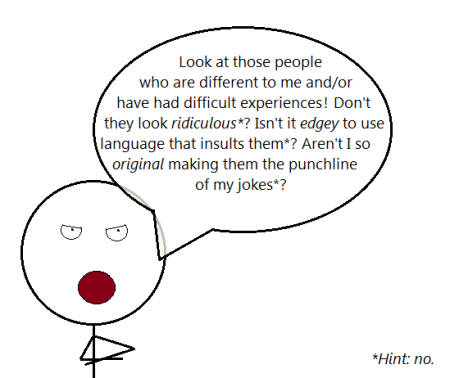


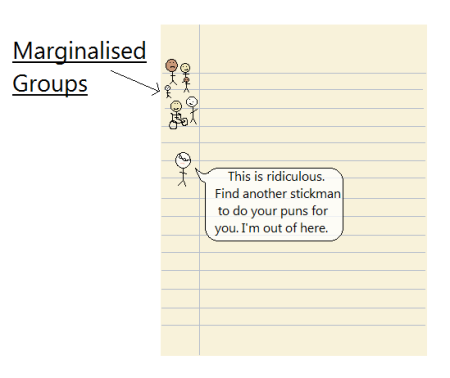
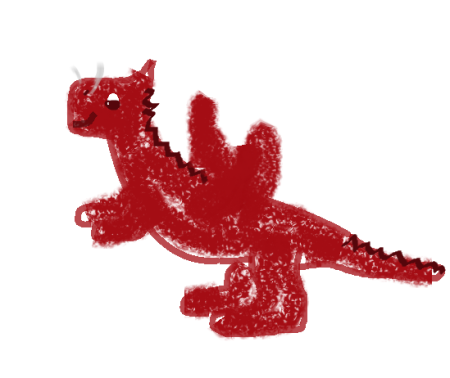

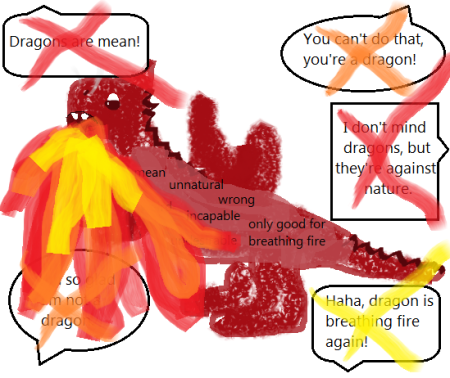


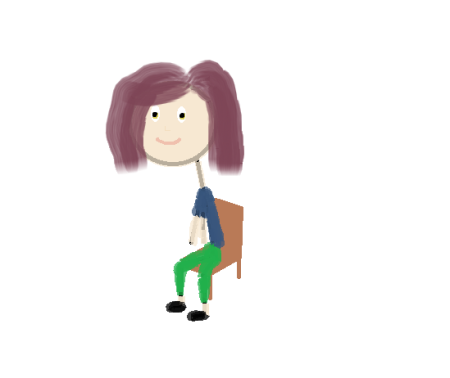




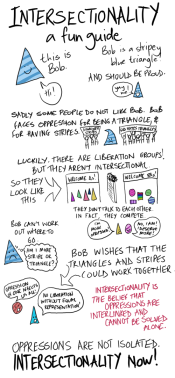
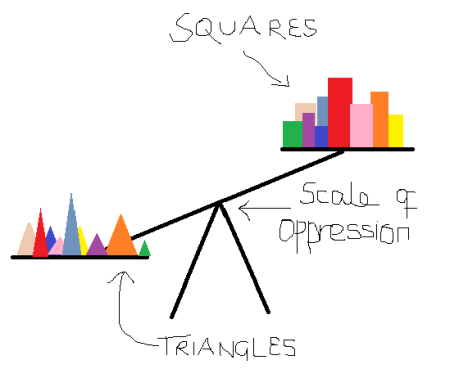
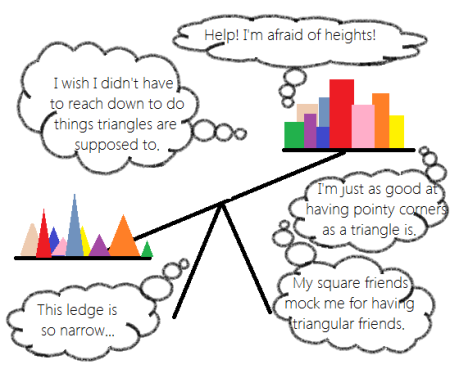
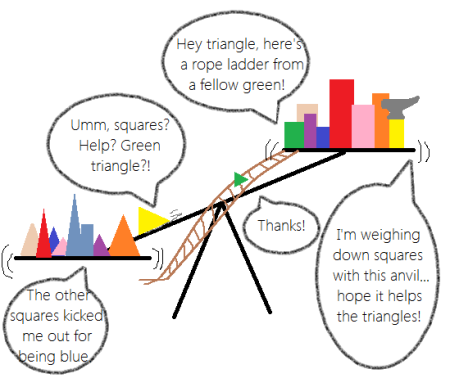


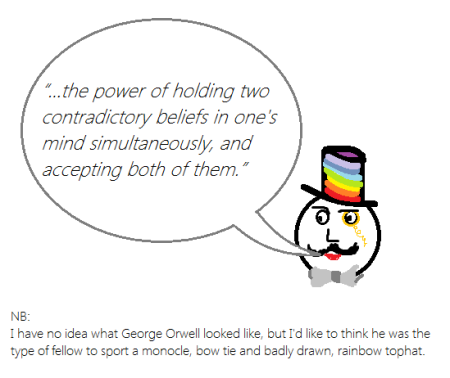

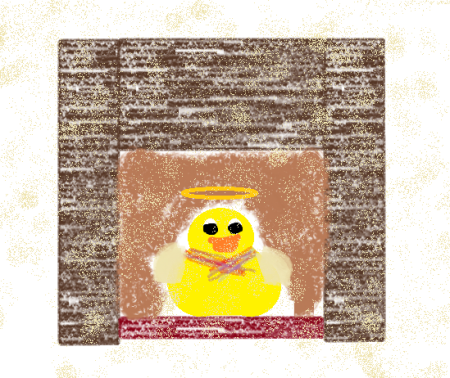


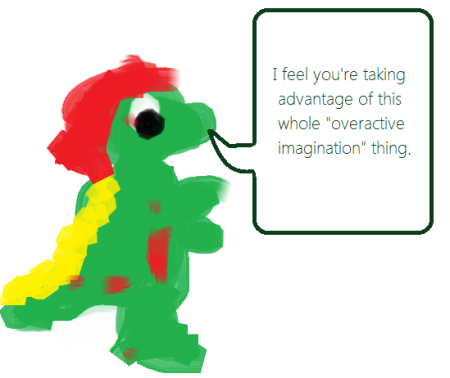
.png)


.png)







